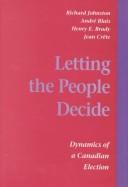Check nearby libraries
Buy this book

This book explores the dynamics of political campaigns in general by attempting to make sense of the specific events of the 1988 Canadian election campaign. The authors had a sophisticated research design in place when the Canadian elections were called. For the sixty days of the campaign, they tracked responses that enabled them to answer such questions as: Do the various elements of a campaign - parties, leaders, issues, campaign rhetoric, debates, advertising, polls - make a difference in electoral results? How do perceptions of leaders affect the public's judgment on issues? How does national and electoral history affect campaign strategy? Their findings contradict those of many earlier studies and are likely to spark a lively debate and a new kind of research on such questions. The authors argue that the election of 1988 became, in large part, a referendum on the Free Trade Association with the United States.
Partly for this reason but primarily because of the book's methodological rigor and novel findings, it will have an audience in the United States well beyond the circle of those interested in Canadian elections per se. Combining existing scholarly literature, historical data, theoretical breadth, analytic innovation, and, most important, their own rich and extensive survey data, the authors come to three main conclusions. The first is that the events of a campaign do have an impact on the final vote. Journalists and candidates take this as a fundamental premise, but until recently, few political scientists concurred. Campaigns, it has long been argued, at most reminded voters about fundamental issues (such as the economy) and voters' long-term predispositions. Second, the authors assert that history sets the stage for campaigns and constrains their possibilities.
Some constraints are shown to be more binding than others and some historical periods to impose more constraints than others. This analysis leads to the construction of a general theory of campaigns, one that can predict when campaigns will and will not be important. Third, the authors conclude that campaigns can do more than determine which party will hold power; they can also be the occasion for a fundamental realignment. The authors support this view by reference both to their research results and to basic theories of social choice.
Check nearby libraries
Buy this book

Previews available in: English
| Edition | Availability |
|---|---|
|
1
Letting the People Decide: The Dynamics of Canadian Elections
October 1, 1992, Stanford University Press
Paperback
in English
0804720789 9780804720786
|
zzzz
|
|
2
Letting the people decide: dynamics of a Canadian election
1992, Stanford University Press
in English
0804720770 9780804720779
|
aaaa
|
|
3
Letting the People Decide: Dynamics of a Canadian Election
October 1992, Stanford University Press
Hardcover
in English
0804720770 9780804720779
|
zzzz
|
Book Details
Edition Notes
Includes bibliographical references (p. [297]-307) and index.
Classifications
The Physical Object
Edition Identifiers
Work Identifiers
Community Reviews (0)
| April 12, 2025 | Edited by MARC Bot | import existing book |
| January 26, 2022 | Edited by ImportBot | import existing book |
| July 1, 2020 | Edited by ImportBot | import existing book |
| April 28, 2010 | Edited by Open Library Bot | Linked existing covers to the work. |
| March 17, 2010 | Created by WorkBot | work found |











